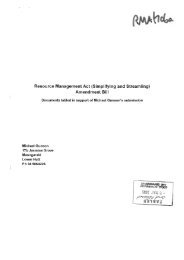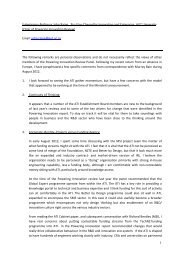Full paper text [PDF 3515k] - New Zealand Parliament
Full paper text [PDF 3515k] - New Zealand Parliament
Full paper text [PDF 3515k] - New Zealand Parliament
Create successful ePaper yourself
Turn your PDF publications into a flip-book with our unique Google optimized e-Paper software.
Standards, amendments, and<br />
interpretations issued but not yet effective<br />
that have not been early adopted, and that<br />
are relevant to the HDC, are:<br />
NZ IFRS 9 Financial Instruments<br />
will eventually replace NZ IAS 39<br />
Financial Instruments: Recognition and<br />
Measurement. NZ IAS 39 is being replaced<br />
through the following three main phases:<br />
Phase 1 Classifi cation and Measurement,<br />
Phase 2 Impairment Methodology, and<br />
Phase 3 Hedge Accounting. Phase 1 has<br />
been completed and has been published<br />
in the new fi nancial instrument standard<br />
NZ IFRS 9. NZ IFRS 9 uses a single approach<br />
to determine whether a fi nancial asset is<br />
measured at amortised cost or fair value,<br />
replacing the many different rules in NZ IAS<br />
39. The approach in NZ IFRS 9 is based on<br />
how an entity manages its fi nancial assets<br />
(its business model) and the contractual<br />
cash fl ow characteristics of the fi nancial<br />
assets. The fi nancial liability requirements<br />
are the same as those of NZ IAS 39, except<br />
for when an entity elects to designate<br />
a fi nancial liability at fair value through<br />
the surplus/defi cit. The new standard is<br />
required to be adopted for the year ended<br />
30 June 2016. However, as a new Accounting<br />
Standards Framework will apply before<br />
this date, there is no certainty when an<br />
equivalent standard to NZ IFRS 9 will be<br />
applied by public benefi t entities.<br />
The Minister of Commerce has approved<br />
a new Accounting Standards Framework<br />
(incorporating a Tier Strategy) developed by<br />
the External Reporting Board (XRB). Under<br />
this Accounting Standards Framework,<br />
HDC is classifi ed as a “Category C”<br />
reporting entity, and it will be required<br />
to apply corresponding Public Benefi t<br />
Entity Accounting Standards (PAS). These<br />
standards are being developed by the XRB<br />
based on current International Public Sector<br />
Accounting Standards. The effective date<br />
for the new standards for public sector<br />
entities is expected to be for reporting<br />
periods beginning on or after 1 July 2014.<br />
This means the HDC expects to transition<br />
to the new standards in preparing its 30<br />
June 2015 fi nancial statements. As the PAS<br />
are still under development, the HDC is<br />
unable to assess the implications of the<br />
new Accounting Standards Framework at<br />
this time.<br />
Due to the change in the Accounting<br />
Standards Framework for public benefi t<br />
entities, it is expected that all new NZ IFRS<br />
and amendments to existing NZ IFRS will<br />
not be applicable to public benefi t entities.<br />
Therefore, the XRB has effectively frozen<br />
the fi nancial reporting requirements<br />
for public benefi t entities up until the<br />
new Accounting Standard Framework is<br />
effective. Accordingly, no disclosure has<br />
been made about new or amended<br />
NZ IFRS that exclude public benefi t<br />
entities from their scope.<br />
Signifi cant accounting<br />
policies<br />
Revenue<br />
Revenue is measured at the fair value of<br />
consideration received or receivable.<br />
Revenue from the Crown<br />
The Health and Disability Commissioner is<br />
primarily funded through revenue received<br />
from the Crown, which is restricted in its<br />
use for the purpose of the Health and<br />
Disability Commissioner meeting his<br />
objectives as specifi ed in the statement<br />
of intent.<br />
Revenue from the Crown is recognised as<br />
revenue when earned and is reported in the<br />
fi nancial period to which it relates.<br />
Interest<br />
Interest income is recognised using the<br />
effective interest method. Interest income<br />
on an impaired fi nancial asset is recognised<br />
using the original effective interest rate.<br />
Sale of publications<br />
Sales of publications are recognised when<br />
the product is sold to the customer.<br />
HDC ANNUAL REPORT 2012<br />
49


![Full paper text [PDF 3515k] - New Zealand Parliament](https://img.yumpu.com/11267192/51/500x640/full-paper-text-pdf-3515k-new-zealand-parliament.jpg)



![Full evidence text [PDF 8908k] - New Zealand Parliament](https://img.yumpu.com/14025494/1/184x260/full-evidence-text-pdf-8908k-new-zealand-parliament.jpg?quality=85)
![−3 JUN 2009 IRELEASED] - New Zealand Parliament](https://img.yumpu.com/12829724/1/185x260/3-jun-2009-ireleased-new-zealand-parliament.jpg?quality=85)


![Full evidence text [PDF 9k] - Parliament](https://img.yumpu.com/7938085/1/184x260/full-evidence-text-pdf-9k-parliament.jpg?quality=85)





